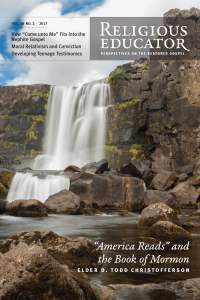The Book of Mormon’s Relevance Today
Editor's Note
This issue of the journal features a little-known talk by Elder D. Todd Christofferson delivered at the Library of Congress to commemorate the Book of Mormon’s naming as one of the most important books published in America. The article is a gem, and although it was not circulated widely to the public, it presents a powerful witness to the reach of the Book of Mormon and its influence in American culture. Over the past two or three decades, scholars have become progressively more aware of the Book of Mormon as a religious text, and academic studies of the book are increasingly fair and sophisticated in their assessments.
As I worked on the articles for this issue, I was particularly impressed with the studies that attempt to grapple with issues of religion in the public square. The studies on moral relativism, marriage equality, and the assessment of the impact of scripture study programs in the Church all share a common thread: an open and balanced inquiry into topics that affect our daily lives. Justin Dyer attempts to situate the discussion of marriage equality within Western cultural thought and also grapples with the phenomenon of broad cultural acceptance. Daniel Frost dissects the current push to maintain an unbiased moral relativism and, in the process, highlights the assumptions upon which the movement is based. And John Hilton III and Anthony Sweat show the impacts in building testimony of different programs such as seminary, Sunday School, Young Men and Young Women programs.
I was also deeply moved in doing the interview with Patrick Mason. He shared a thought that caught my attention, and I have returned to it in my mind several times, “If we are not disturbed by what happened at Mountain Meadows, that is a condemnation on our ethical sensibilities.” I hope you’ll take a minute to read the interview as well as the other compelling contributions.
Thomas A. Wayment
Editor in Chief
